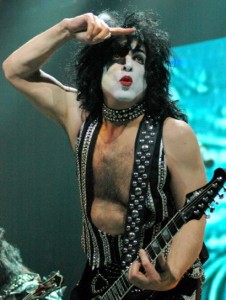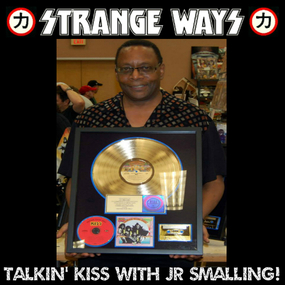Mitch Lafon | Brave Words
 On June 10th, Paul Stanley held a special press only conference call to discuss KISS’ upcoming tour with Def Leppard and his New York Times’ best selling book, Face The Music: A Life Exposed. Journalists from across Canada and the US were able to ask one question plus a follow-up. What you will read below are Paul’s answers to the questions that were posed (in proper sequence) by the various media invited to the one-hour event. In part two, Paul addresses more local issues as well as the importance of supporting the troops.
On June 10th, Paul Stanley held a special press only conference call to discuss KISS’ upcoming tour with Def Leppard and his New York Times’ best selling book, Face The Music: A Life Exposed. Journalists from across Canada and the US were able to ask one question plus a follow-up. What you will read below are Paul’s answers to the questions that were posed (in proper sequence) by the various media invited to the one-hour event. In part two, Paul addresses more local issues as well as the importance of supporting the troops.
When asked about performing for Nashville audiences, Stanley had this to say, “We’ve been coming to Nashville since playing Mother’s (April 1974)which for me was a legendary show. I still remember the yellow t-shirts. We were coming to Nashville when perhaps there was a large segment of Nashville that didn’t quite embrace us. Things have changed over the years. Nashville has always been a music community; although the scope of what was called country was much narrower when we first came in. Country music now is not only built on Hank Williams, Loretta Lynn or George Jones. It’s reached a point now where it’s also built on The Eagles, Queen, and KISS. Many of the later generations of country artists grew up embracing rock n’ roll. It’s an incredibly vibrant and healthy community. It’s fertile to say the least and I love what Nashville has evolved into. There’s a lot of great music coming out of Nashville. We know we’re playing for musicians that we respect and we go in there to do our best.”
In years past, many bands including KISS controlled the amount of information that was available to the public. Now with social media, everything becomes immediate fodder for public consumption. Asked if there is simply too much information available these days and if it hurts the mystique, Paul replied, “Certainly, in all walks of life (in terms of public figures) there is a certain mystique that is gone because everything is known. I think mystique is healthy. I think to glamorize and fantasize is a good thing. I’m not sure KISS could have accomplished what we did initially in this time because we could make sure photos weren’t available. The paparazzi didn’t have photos of us out of makeup. We could create this mystique. It wasn’t unlike the mystique of Hollywood in the ‘30s and ‘40s which was a romanticized version of reality. I’m a fan of it. We’ve progressed and evolved over time into something much bigger in scope, but our roots are quite clearly in the mythical.”

 JR SMALLING dropped by to talk KISS with us! We discuss the brand new ebook, “OUT ON THE STREETS”, and in typical STRANGE WAYS fashion, we also touch on a wide variety of KISS topics, sure to put a smile on your face! We hope you enjoy, KISS Army!!! And as always..Thanks for listening, and keep on rockin’!!!
JR SMALLING dropped by to talk KISS with us! We discuss the brand new ebook, “OUT ON THE STREETS”, and in typical STRANGE WAYS fashion, we also touch on a wide variety of KISS topics, sure to put a smile on your face! We hope you enjoy, KISS Army!!! And as always..Thanks for listening, and keep on rockin’!!!